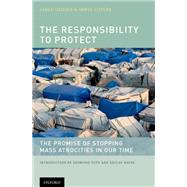- ISBN: 9780199797769 | 0199797765
- Cover: Hardcover
- Copyright: 12/1/2011
In The Responsibility to Protect: The Promise of Stopping Mass Atrocities in Our Time, Jared Genser and Irwin Cotler provide a comprehensive overview on how this contemporary principle of international law has developed and analyze how best to apply it to current and future humanitarian crises. The "responsibility to protect" is a doctrine unanimously adopted by the UN World Summit in 2005, which says that all states have an obligation to protect their own citizens from mass atrocities, which includes genocide, war crimes, crimes against humanity, and ethnic cleansing. Its adoption and application has generated a passionate debate in law schools, professional organizations, media and within the U.N. system.
To present a full picture of where the doctrine now stands and where it could go in the future, editors Jared Genser and Irwin Cotler have assembled a global team of authors with diverse backgrounds and differing viewpoints, including Edward Luck, the UN Secretary-General's Special Advisor on the Responsibility to Protect. Genser and Cotler balance the pro-RtoP chapters with more skeptical arguments from agency staff and scholars with long experience in addressing mass atrocities. Framed by a Preface from Desmond Tutu and Vaclav Havel and a Conclusion from Gareth Evans, these in-depth and authoritative analyses move beyond theory to demonstrate how RtoP has worked on the ground and should work if applied to other crises. The global focus of this book, as well as its detailed application of the principle in case studies make it uniquely useful to staff at international organizations and NGOs considering use of the principle in a given circumstance, to scholars providing advice to governments, and to students seeking guidance on this still-expanding subject.
To present a full picture of where the doctrine now stands and where it could go in the future, editors Jared Genser and Irwin Cotler have assembled a global team of authors with diverse backgrounds and differing viewpoints, including Edward Luck, the UN Secretary-General's Special Advisor on the Responsibility to Protect. Genser and Cotler balance the pro-RtoP chapters with more skeptical arguments from agency staff and scholars with long experience in addressing mass atrocities. Framed by a Preface from Desmond Tutu and Vaclav Havel and a Conclusion from Gareth Evans, these in-depth and authoritative analyses move beyond theory to demonstrate how RtoP has worked on the ground and should work if applied to other crises. The global focus of this book, as well as its detailed application of the principle in case studies make it uniquely useful to staff at international organizations and NGOs considering use of the principle in a given circumstance, to scholars providing advice to governments, and to students seeking guidance on this still-expanding subject.







